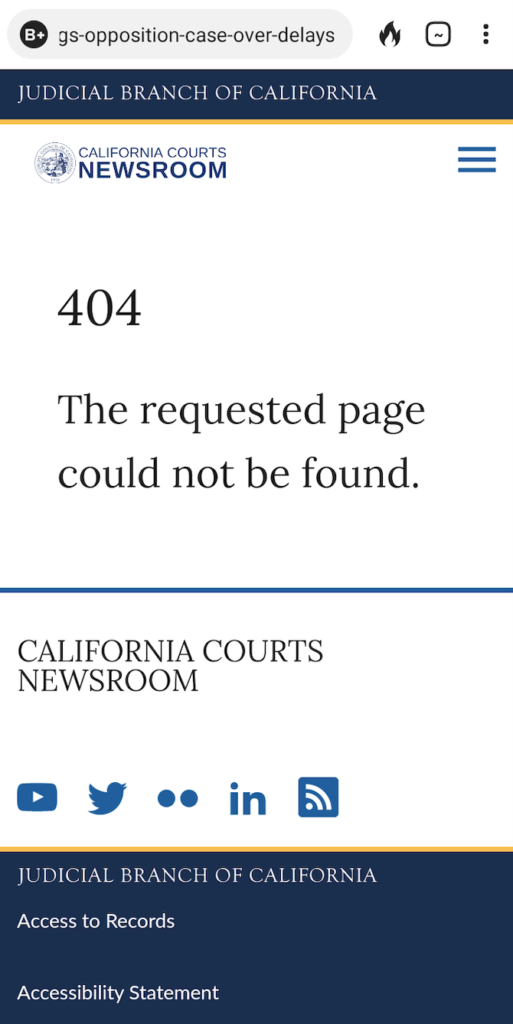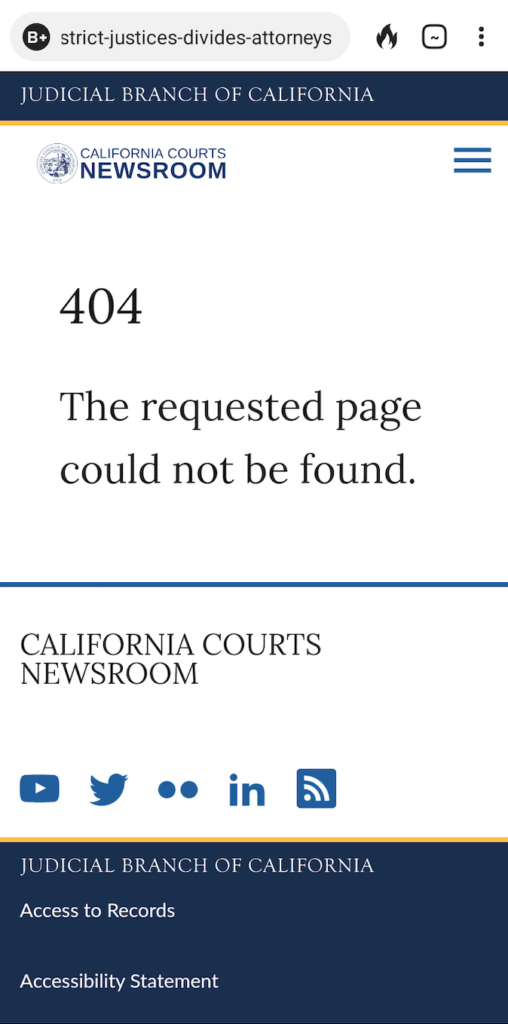Editorial Board of the Left Opposition, Ariel Plotnik
In a lawsuit addressing one of many corruptions of the Courts in California, retired appellate attorney Joe Eisenberg sued a justice of the Court of Appeal, Third District for delays in opinions. In his petition numbered S269691 with the Supreme Court of California retired appellate attorney Joe Eisenberg alleged that the Third District has for years systematically absolutely refused to comply with a statutory mandate requiring the Court of Appeals in California to calendar criminal appeals preferentially.
With over 106 justices the California Courts of Appeal are the state intermediate appellate courts in the State of California with a division along geographical lines into six appellate districts, forming the largest intermediate appellate Court system in the United States of America.
During 2018 the Court of Appeal, Third District, one of the six districts, carried the highest number of pending, fully briefed, argued appeals per authorized justice among all of the State’s appellate districts. It is more than likely the result of a concerted effort to prevent any reduction in its decisional hierarchy. The preservation of which proceeds from the insistence upon a maintenance of no more than a single district with no divisions. In other districts throughout the State, for instance, the Courts of Appeal in California reduce decisional hierarchy through the introduction of divisions. In contrast, for instance, to the Federal government’s Court, there is no horizontal stare decisis in the California Court of Appeal so that opinions are not binding between divisions or even between panels of the same division. Since the Court of Appeal, Third District insists upon the maintenance of no more than a single district with no divisions, the Court of Appeal, Third District, thereby, prevents any reduction in its decision hierarchy within the geographical landmass over which its reigns with decisional hegemony.
The case Eisenberg v Court of Appeal (i.e., S269691) is unprecedented in both scope and scale. It is highly unusually for attorney, let alone an appellate attorney, to appear on his or her behalf to file a Petition or a Petition for Writ of Mandate in propria persona , especially for a lawyer as accomplished as Eisenberg. It is often the case within the legal community to joke: “A lawyer who represents himself has a fool for a client.” It is not the case with Eisenberg. Eisenberg’s lawsuit proceeds in propria persona . Over and above his decision to proceed in propria persona, Eisenberg’s petition is extraordinary for the number of exhibits alone. His Petition for Writ of Mandate is no less than six volumes of exhibits with (Volume I of IV comprising pages 1 to 282, Volume II of IV comprising 283 to 564, Volume III of IV comprising pages 565 to 846, Volume IV of IV comprising pages 847 to 1117), an unprecedented number of exhibits for a Petition for Writ of Mandate.
Notwithstanding the number of exhibits, Eisenberg’s Petition is remarkable for the judiciary’s reaction, to say the least. No less than 10 days after the Petition’s filing on on 7/6/21, Chief Justice Tani Cantil-Sakauye and Associate Justice Carol Corrigan recused themselves from any participation in the matter. It is highly likely, however, that their recusal is merely pro forma. She more than likely directed the issuance of an opinion behind the scenes.
Eisenberg’s Petition for Writ of Mandate specifically targets the Presiding Judge’s failure to comply with his statutory duty as the Third District’s Administrative Presiding Justice to accord calendar preference to criminal appeals. The presiding judge is Vance W. Raye. Eisenberg explains that during the entirety Raye’s decade-long tensure as the Third District’s Administrative Presiding Justice, the Court “failed to perform its statutory duty to accord calendar preference to all criminal appeals and its constitutional duty to ensure that the criminal appellate process is timely, thus presumptively prejudicing the defendants in inordinately delayed appeals.”
Eisenberg establishes his claim on the basis of two sets of irrefutable facts. Since 2018, for instance, the Third District has delayed calendaring at least 278 fully briefed criminal appeals for at least 12 months and as long as 99 months. At the time of the writing of the Petition, Eisenberg stated: “At least 66 additional criminal appeals currently pending in the Third District are now fully briefed yet have remained uncalendared for at least 12 months and as long as 41 months, despite the ongoing calendaring of civil appeals that were fully briefed more recently, thus presumptively prejudicing the defendants in those criminal appeals.”
At the close of the factual basis for his argument, Eisenberg states unequivocally, “These systemic delays have operated to deny hundreds of criminal defendants the right to a timely appellate process.”
Although common for not only the trial, appellate or California Supreme Court to deny petitions summarily, the summary denial is usually done in such as way as to leave no doubt that the Court considered absolutely no aspect of the Petition itself (i.e., to inculcate the greatest disdain for the Petition, his or her petition or the petition’s relief). Due to the factual basis in Eisenberg’s Petition, the Supreme Court of California had not choice but to meet the muster.
Despite being a quasi criminal indictment against Raye, if not the Court of Appeal, Third District, the Supreme Court of California refused to allow defendant Raye’s case to languish, hastily issuing an opinion rife with hypocrisy. The opinion states: “The petition for a writ of mandate is denied. We recommend that within 180 days of this order, the Judicial Council complete an investigation of alleged delays in the Third District Court of Appeal’s disposition of criminal appeals and, if appropriate, propose measures that the Judicial Council and the Court of Appeal should employ to address any problems that are identified.”
The hypocrisy of the opinion is discernible immediately from its refusal to grant the Petition, at the same time that the Court’s concession for a requirement to investigate Raye’s performance as the Administrative Presiding Justice on criminal appeals implicitly indicts Raye’s practice of failing to calendar criminal appeals. The line, “any problems that are identifiable,” is obviously an overt denial of the factual basis for Eisenberg’s argument. It is therefore clear from the opinion’s language that absolutely none of the problems are to be identified.
An Internet cover up ensued with speed the likes of which criminal defendants in the Court of Appeal, Third District could have only dreamed. On the website for the Judicial Branch of California (i.e., newsroom.courts.ca.gov), articles addressing Eisenberg’s complaint have been disappeared, returning a 404 (i.e., “The requested page could not be found.”) A 404 is an error code from the Hyper Text Transfer Protocol in computer network communications for responses from servers in which the browser is able to communicate with a server but the server is not able to find what is requested.

On the Judicial Branch of California’s website the following articles appear to have been disappeared: 1) complaint-against-3rd-district-justices-divides-attorneys, 2) 3rd-district-trades-filings-opposition-case-over-delays. These certainly indications of the degree to which the judiciary, especially the trial, appellate or Supreme Court of California, if the Judicial Branch of California itself, sought to hastily cover up any mention of Eisenberg’s lawsuit.

California’s judiciary, especially its Judicial Branch of California, does not offer the public a forum for its criticism. The vast majority of the judiciaries at the more than 56 counties in the State of California still operate on a paper filing system, forbidding e-filing of any kind ( which is unlike the Federal government’s system called PacerMonitor, requiring e-filing for the vast majority of cases ). There is no public forum in which to express outrage at what undeniably constitutes an unconscionable deprivation of the rights of criminal defendants.
Lawsuits critical of California’s judiciary are highly disfavored, automatically stigmatizing, isolating, or, often times, resulting in a lawyer’s disbarment for a petty offense. Prior to filing, Eisenberg likely knew that his lawsuit would never prevail or would have absolutely no chance of prevailing under any circumstance. Eisenberg is now retired with an inactive bar number.
Eisenberg’s lawsuit against the Court of Appeal for the Third District’s Administrative Presiding Justice, Vance Raye, comes against the backdrop of unprecedented, social, economic and political crisis. Filed on July 6th, 2021, Eisenberg’s lawsuit is no less than seven months after Donald J Trump’s fascist insurrection at the US Capitol on January 6th, 2022, Eisenberg’s lawsuit addressing an issue hitherto-fore unspeakable is undoubtedly a reflection of the degree to which the judiciary is beginning to fracture and the uncrossable red lines are being crossed not just within the White House itself but within the State of California, and throughout its judiciary.
